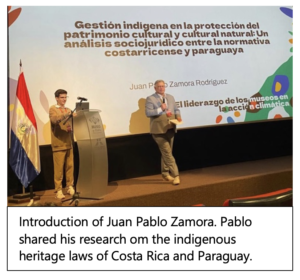December 3, 2023
MUSEUM LEADERSHIP IN CLIMATE CHANGE : REPORT BY INTERCOM TREASURER HANS VAN DE BUNTE Highlights
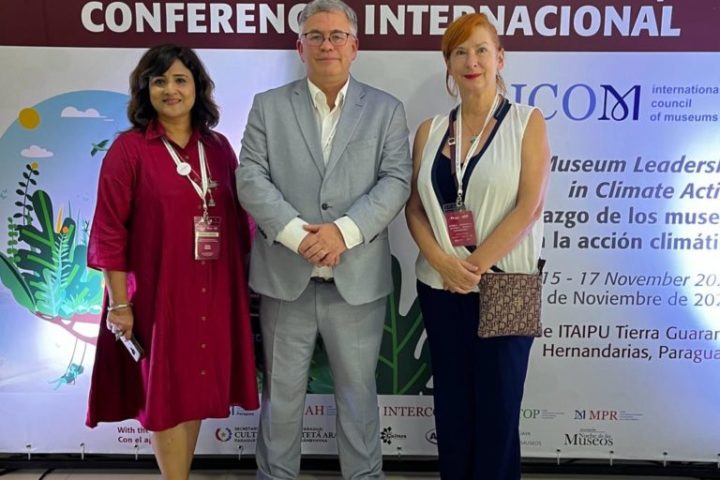
MUSEUM LEADERSHIP IN CLIMATE CHANGE
Museo de ITAIPU Tierra Guarni, Hernandarias, Paraguay, 15-17 November 2023
Hans van de Bunte
700,000 Liters of water per second flows through each of the ten turbines in the ITAIPU hydro electric power plant on the border of Paraguay and Brazil. The Itaipu power plant provides around 90% of the electricity consumed in Paraguay and 10% in Brazil. The dam, a visionary and massive construction from the 1970s and ‘80s, was an easy choice for the conference committee as the location for this annual conference of INTERCOM, ICOM’s International Committee for Museum Management. As the co-organising board member and co-moderator to the conference, I worked together with four partner committee’s. Besides the host ICOM Paraguay, these were the committee’s of ICMAH, ICTOP and MPR.
In my view, in addition to the advantage of sharing costs and work load, the goal of a joint organisation is bringing different views and expertise to the conference during the organisation from the start, and, during the conference, all participants are given the change to internationally interact with each other and build on their professional network and knowledge from various museum expertise.
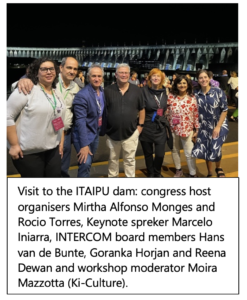
Thanks to financial support from ICOM The Netherlands, I was able to travel to Paraguay and stay at my accommodation, including the transfer in São Paulo (Brazil). Our hostess Mirtha Alfonso Monges was our organizational beacon from Museo de ITAIPU. Without her and her team the conference wouldn’t have been such a great success.
It was pleasantly new for me to attent a conference where Spanish was the main language and translators were present for English speakers. The organisation in Paraguay indicated that it was a special honor to be able to host an international museum conference. In total, more than 200 participants from 41 countries had registered. On behalve of INTERCOM I took up the role as moderator during the 2nd day of the conference
For me personally the conference was particularly enriching. A broad representation of speakers from Latin America and worldwide gave me new insights into the different approaches from the Global South and North in their understanding and then tackling climate change.
My insight grew on when and how to activate staff and/or through my museum to raise awareness towards audiences. Or even to be able to choose to go the extra mile and stand up and become activistic on an institutional level.
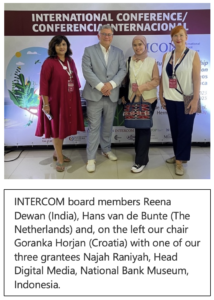
Several presentations gave me concrete and practical examples. For example, Katrina Orsini (GWU Textile Museum (USA)) gave wonderful examples of participatory projects in recycling and up-cycling fashion. Eugenia Villarmarzo (VHCE, Uruguay) shared her research results on the impact of tourism on archaeological coastal sites. Marcelo Iniarra (Argentina), co-chairman of Greenpeace International and my personal choice for INTERCOM’s keynote, kicked off the 2nd day with an energetic presentation about activating leadership, reaching out to and involving your own community.
INTERCOM invited Moira Mazzotta of Ki-Culture to provide 2 workshops on Leadership in Sustainability for Culture. In groups participants discussed their personal views on leadership and how a museum can become an active leader in stopping climate change. Although participants in both groups, one in English and one in Spanish, gave similar characteristics to the role of a leader, in the execution of projects there was a difference. New idea’s often get the support from their leaders, but in Latin American museums the execution of the initiative may strand in lengthily bureaucratic procedures with the risk of not being able to start at all.
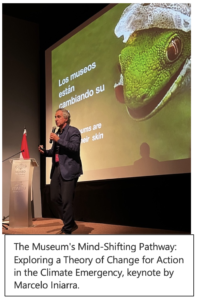
From INTERCOM a committee on speakers and bursaries was formed by board members Marek Prokupek, Héloïse Amez-Droz and myself. Out of 30-over abstracts we selected 7 speakers and in the end we were happy to give 3 grantees financial support for their travel and accommodation. Juan Pablo Zamora from Costa Rica gave a presentation and Najah Raniyah from Indonesia and María Susana Robledo from Equador will both hand in a short article with their personal findings from the conference.
In addition, I take home valuable insights from indigenous communities who, thanks to their intimate relationship with nature and close ties to their ancestral lands, own a ‘natural’ sense of respect and with that the urgency for action on climate change. As well as their natural way of living includes protecting the nature around them. Something I had no idea about. Probably because while growing up in the Netherlands, the relationship with nature and my ancestors was quickly lost in the individualistic society of the Netherlands. And where, to be honest, all nature has been almost completely eradicated by us, humans, in exchange for cultivated agricultural lands and organised forests.
